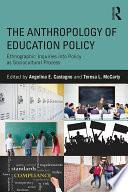
The Anthropology of Education Policy
Ethnographic Inquiries into Policy as Sociocultural Process
Advancing a rapidly growing field of social science inquiry—the anthropology of policy—this volume extends and solidifies this body of work, focusing on education policy. Its goal is to examine timely issues in education policy from a critical anthropological, ethnographic, and comparative perspective, and through this to theorize new ways of understanding how policy "does its work." At the center is a commitment to an engaged anthropology of education policy that uses anthropological knowledge to imagine and foster more equitable and just forms of schooling. The authors examine the ways in which education policy processes create, reflect, and contest regimes of knowledge and power, sorting and stratifying people, ideas, and resources in particular ways. In contrast to conventional analyses of policy as text-based, dictated, linear, and rational, an anthropological perspective positions policy at the interface of top-down, bottom-up, and meso-level processes, and as de facto and de jure. Demonstrating how education policy operates as a social, cultural, and deeply ideological process "on the ground," each chapter clearly delineates the implications of these understandings for educational access, opportunity, and equity. Providing a single "go to" source on the disciplinary history, theoretical framework, methodology, and empirical applications of the anthropology of education policy across a range of education topics, policy debates, and settings, the book updates and expands on seminal works in the field, carving out an important niche in anthropological studies of public policy.
- ISBN 13 : 1317312457
- ISBN 10 : 9781317312451
- Judul : The Anthropology of Education Policy
- Sub Judul : Ethnographic Inquiries into Policy as Sociocultural Process
- Pengarang : Angelina E. Castagno, Teresa McCarty, Teresa McCarty, Teresa McCarty,
- Kategori : Education
- Penerbit : Routledge
- Bahasa : en
- Tahun : 2017
- Halaman : 256
- Google Book : https://play.google.com/store/books/details?id=wkYrDwAAQBAJ&source=gbs_api
-
Ketersediaan :
Advancing a rapidly growing field of social science inquiry—the anthropology of policy—this volume extends and solidifies this body of work, focusing on education policy.









